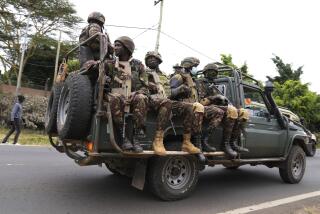15,000 in Johannesburg Join Apartheid Protest
- Share via
JOHANNESBURG, South Africa — Taking advantage of the government’s new, more relaxed approach to peaceful protest, about 15,000 chanting and singing anti-apartheid activists marched through the streets of downtown Johannesburg to police headquarters Friday.
The Johannesburg march and a smaller one in Pretoria were the latest in a series of processions South Africa has allowed since Wednesday, when Archbishop Desmond M. Tutu led 20,000 protesters through Cape Town.
In Cape Town and Johannesburg, the government of new President Frederik W. de Klerk has taken the unusual step of granting permission for the protests, illegal under the three-year-old state of emergency. It is one of the only times in memory that the white minority-led government has actually approved a protest against its own system of racial segregation.
The new policy, portrayed by De Klerk as proof of his sincerity about reform of apartheid, has provided an important safety valve for anti-apartheid protest, which in recent weeks had brought dozens of bloody clashes between police and activists. Civil rights leaders say that 30 demonstrators and bystanders died at the hands of police during Sept. 6 protests against parliamentary elections from which blacks were excluded.
“From the little space the government has opened, they’ve given us a chance to show we can demonstrate peacefully, which we’ve used effectively,” said the Rev. Frank Chikane, general secretary of the South African Council of Churches, who led Friday’s march.
“A few marches don’t mean a liberated country,” added Methodist Bishop Peter Storey. “But big doors do swing on little hinges.”
Black and white marchers, including professors in academic gowns and clerics in robes, carried placards and banners for various banned organizations. Winnie Mandela, wife of jailed nationalist leader Nelson R. Mandela, wore the colors of the outlawed African National Congress and held a portrait of her husband.
Police cleared the procession route of the usual heavy lunchtime traffic, white shopkeepers watched from the sidewalks, and black construction workers, standing on girders above the crowd, smiled and raised fists in salute.
After a service at St. Mary’s Cathedral, the protesters walked 10 blocks to police headquarters. Chikane presented a protest letter, addressed to Minister of Law and Order Adriaan Vlok, to the station commander, and the crowd dispersed quietly.
The letter said that if the government is serious about reform, it must release all political prisoners, lift the ban on anti-apartheid groups, give blacks the vote, and restore freedom of speech and assembly, among other things.
“Many of our people are frustrated by the rule of an undemocratic and racist minority and by the lack of meaningful change,” the letter said. “Whites can express their political aspirations at the ballot box, (but) the only real way for the majority of our people is through demonstration services and processions.”
Johannesburg bureau researcher Vaun Cornell contributed to this story.
More to Read
Sign up for Essential California
The most important California stories and recommendations in your inbox every morning.
You may occasionally receive promotional content from the Los Angeles Times.











